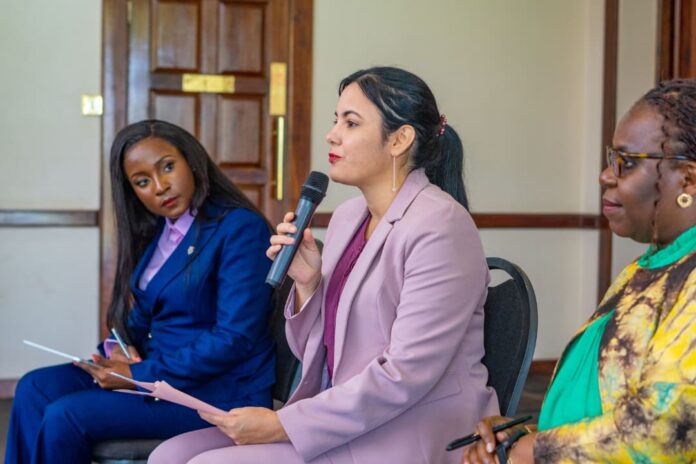BY PAMELA MACHIDHA
When Cuba’s Ambassador to Zimbabwe, H.E. Ms. Susellys Pérez Mesa, rose to speak at the Diplomat Business Networking Club Breakfast Meeting at the Royal Harare Golf Club, she carried not only the weight of her nation’s proud medical legacy but also a message of solidarity, renewal, and shared purpose.
“How can we better improve the health and wellness sector in Zimbabwe?” she asked the audience. The question, both practical and visionary, set the tone for a conversation that underscored nearly four decades of friendship between Cuba and Zimbabwe — and a future built on innovation, compassion, and cooperation.
A Record of Service and Humanity
Accompanied by Minister Counsellor Mr Luis Enrique González Acosta and Dr María Eugenia García Céspedes, Head of the 14th Cuban Medical Brigade, Ambassador Pérez Mesa praised the team’s achievements since 2023.
“Our 14th Brigade, working in six hospitals across Harare and Bulawayo, includes professionals from nine medical specialties,” she said. The team has provided more than 61,000 consultations, performed 2,107 surgeries, and completed 4,300 autopsies.
She also highlighted their outreach to remote communities and centres for children with disabilities. “They even volunteer their free time to serve those most in need,” she added.
Cuban electromedicine specialists, she noted, have been instrumental in repairing hospital equipment and restoring infrastructure, particularly at the United Bulawayo Hospitals (UBH).
A Legacy of Cooperation
Cuba began medical collaboration with Zimbabwe in 1986, and since 2000 alone, more than 1,000 Cuban doctors have served here. Globally, over 605,000 Cuban health workers have served in 165 nations over six decades.
“The robustness of Cuba’s healthcare system and its international cooperation are well known,” Pérez Mesa said. “Our principles include finding solutions to health problems that are accessible to all — especially through prevention and primary care.”
That system is anchored in 10,835 family doctor and nurse offices and 451 polyclinics, producing health indicators comparable to those of developed nations despite limited resources.
“Primary care is the golden standard for any health system in the world,” she affirmed. “It is the axis that cuts across all levels of care.”
In 2015, Cuba became the first nation recognised by PAHO/WHO for eliminating mother-to-child transmission of HIV and congenital syphilis — a milestone of its preventive approach.
Expanding Cooperation
Ambassador Pérez Mesa outlined new avenues for collaboration between Cuba and Zimbabwe, emphasising innovation and shared growth. “Cuba administers 17 vaccines, 10 produced locally — including for tuberculosis, hepatitis, and cervical cancer,” she said, noting the potential for strengthening immunisation programmes.
She highlighted opportunities in biotechnology through BIOCUBAFARMA, which could bring advanced therapies such as Heberprot-P for diabetic patients and enable joint pharmaceutical ventures in Zimbabwe.
Education remains a cornerstone of the partnership, with Cuba’s 13 medical universities training more than 113,000 students guided by 28,000 professors, while Zimbabwean professionals continue to benefit from postgraduate studies.
The Ambassador also underscored Cuba’s readiness to support telemedicine programmes and assist in public health initiatives such as cancer prevention and occupational health. Finally, she encouraged investment in health infrastructure and technology, envisioning Zimbabwe as a regional hub for Cuban medical innovation.
Science with Conscience
The Ambassador commended Zimbabwe’s progress in public health and recalled Health Minister Hon. Dr Douglas Mombeshora’s participation at CubaSalud 2025, held under the One Health paradigm.
“For Cuba, this is not an academic utopia,” she said, “but an urgent necessity for the survival and well-being of all living beings on the planet.”
Quoting a key message from the convention, she added:
“Faced with global threats such as pandemics, climate change, and health inequalities, our response cannot be fragmented. It must be one — science with conscience, solidarity, and human commitment without borders.”
A Model for the World
As Zimbabwe expands its health capacity and medical workforce, the Cuba–Zimbabwe partnership stands as a living model of South–South cooperation — built not on profit, but on shared purpose.
“The essence of our cooperation,” Ambassador Pérez Mesa concluded, “is simple: to serve, to heal, and to stand together — as nations and as human beings.”

